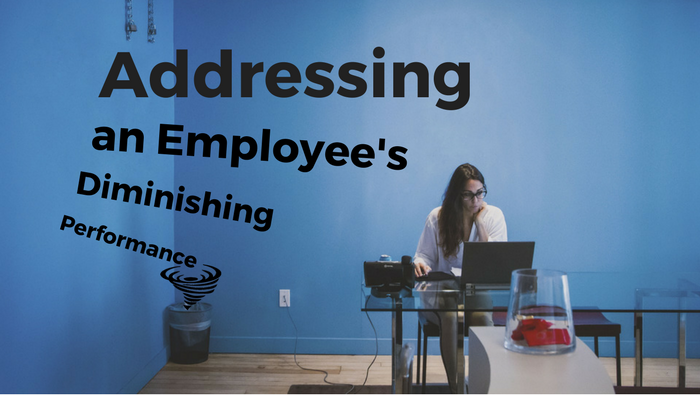![]()
My leadership blog is all about helping current and emerging leaders learn how to transform difficult conversations and dysfunctional workplace relationships into positive and productive ones.


Addressing a Diminishing Job Performance
/
An employee demonstrating diminishing job performance is both common and important enough that, as a leader/manager, you need to know how to address it effectively.
/
From what I’ve seen in my practice, many leaders/managers consider this a difficult conversation to even initiate, let alone execute effectively.
/
Here’s how you can begin that conversation in a way that will yield a positive and productive outcome.
/
In general terms, the answer to reversing a situation of diminishing job performance is to get your employee to either:
/
»» Start doing something,
»» Start doing something BETTER, or
»» Stop doing something.
/
And sometimes it’s some multiple/combination of those things.
/
Now, just telling your employee to start/improve/stop seldom works and, if it does, the change will almost always be temporary.
/
The first thing you need to do is understand why this change in performance/behaviour is happening — and you’re best to start from a place of non-judgement.
/
S E E K F I R S T T O U N D E R S T A N D

/
Arrange to have a conversation in a private setting. A neutral place such as a meeting room helps to suspend an unhelpful power dynamic that could be present in your personal office space. The initial tone and feeling of the conversation should be more human-to-human and less boss-to-employee.
/
//
Opening the Conversation:
/
Open your conversation with something like this …
/
“I’ve noticed that your job performance has dropped lately, Chris.
I’m used to you operating on a higher level and I just want to check in with you on that.
Can you shed some light for me on what’s happening?”
/
Let’s unpack this wording a bit …
/
Sentence #1:
-
You are getting right to the point of the conversation. This helps you stay focused and Chris isn’t left feeling anxious in wondering what the conversation’s going to be about.
-
You are making an observation about Chris’ performance, not casting blame/shame by saying something like, “You’ve been doing a lousy job lately.”
Sentence #2:
-
It’s clear to Chris that you acknowledge this is a change from a higher performance level, which will reduce any defensiveness.
-
Your intention is clear — you have general concern for Chris; you want Chris’ perspective and are not making any assumptions.
Sentence #3:
-
This is an open invitation for Chris to share, not a demand for accountability.
-
You may think you know the reasons for the diminishing performance but people feel more empowered and respected when they’re giving the opportunity to self-assess … plus, you might be wrong.
-
At the end of this sentence, remain silent until Chris has had time to process and respond.
/
/
Employee’s Possible Responses:
/
Chris’ response will likely come in one of three flavours. Here’s what they are and how you can respond, in turn:
/
Response A:
Chris responds openly with thoughts of what the root cause(s) of the diminishing performance are.
If this happens, it’s a sure sign that Chris trusts you. Give yourself an Awesome Leader checkmark!
/
Response B:
Chris will refute your claim.
/
There are two reasons why Chris might do this:
/
»» Chris agrees but is too egotistical or embarrassed to say so
»» Chris doesn’t agree
/
Either way, you need to respond with specifics that support your claim, e.g.:
/
“You haven’t met your quota for the past two months.”
“You were two weeks late in finishing your part of the System-X project, which pushed our go-live date back another month.”
“Accounting had to send your monthly budget status report back to you three times for you to correct significant errors.”
/
Again, it’s important to cite such things as observations, without hostility.
/
After you lay out the specifics, it will help reduce any defensiveness that might have creeped up by saying something like, “And this just isn’t the solid level of job performance that you’ve always delivered.”
/
Response C:
Chris will acknowledge his poor performance but will say something like, “I’m not really sure why things aren’t going well lately.”
/
A response like this can mean either:
/
»» Chris does know what’s going on but isn’t feeling comfortable enough to talk about it yet (it comes down to trust) or, less likely,
»» Chris really doesn’t know why this is happening.
/
If it means the former you need to re-extend the invitation to share; if it means the latter then you need to try and help Chris figure it out.
/
Either way, there are two specific further lines of enquiry for you to move to now, in order: (Note that both of them still invite Chris to self-assess.)
/
1. Work Environment:
“Can you think of any systemic or procedural issues, or interpersonal problems that could be affecting your performance?”
/
If that yields fruit, continue the conversation. If it doesn’t yield fruit, go to the next line of enquiry,
/
2. Personal Life:
“Can you tell me about anything that’s going on in your personal life that could be affecting your performance at work? We’re all human and sometimes life’s circumstances are really hard to manage.”
/
The second sentence helps normalize the situation in Chris’ mind and continue to make Chris feel less vulnerable.
/
If this line of enquiry yields fruit, continue the exploration.
/
If this doesn’t yield fruit either, then one of two things is likely going on:
»» Chris is feeling too vulnerable to share these things with you — you need to build up more trust.
»» Chris isn’t emotionally ready to recognize the source of problems and may need time and/or professional help to figure this out.
/
So those are a few paths that lead to the first thing you need to accomplish when addressing an employee’s diminishing job performance — understand the root cause(s) — why it’s happening.
/
Of course, there’s quite a way to go before this conversation plays out, but that’s where I’m going to leave things today.
/
Have a productive and enjoyable day!
/
— Brie
/
Blog Post

Addressing a Diminishing Job Performance
/
An employee demonstrating diminishing job performance is both common and important enough that, as a leader/manager, you need to know how to address it effectively.
/
From what I’ve seen in my practice, many leaders/managers consider this a difficult conversation to even initiate, let alone execute effectively.
/
Here’s how you can begin that conversation in a way that will yield a positive and productive outcome.
/
In general terms, the answer to reversing a situation of diminishing job performance is to get your employee to either:
/
»» Start doing something,
»» Start doing something BETTER, or
»» Stop doing something.
/
And sometimes it’s some multiple/combination of those things.
/
Now, just telling your employee to start/improve/stop seldom works and, if it does, the change will almost always be temporary.
/
The first thing you need to do is understand why this change in performance/behaviour is happening — and you’re best to start from a place of non-judgement.
/
S E E K F I R S T T O U N D E R S T A N D

/
Arrange to have a conversation in a private setting. A neutral place such as a meeting room helps to suspend an unhelpful power dynamic that could be present in your personal office space. The initial tone and feeling of the conversation should be more human-to-human and less boss-to-employee.
/
//
Opening the Conversation:
/
Open your conversation with something like this …
/
“I’ve noticed that your job performance has dropped lately, Chris.
I’m used to you operating on a higher level and I just want to check in with you on that.
Can you shed some light for me on what’s happening?”
/
Let’s unpack this wording a bit …
/
Sentence #1:
-
You are getting right to the point of the conversation. This helps you stay focused and Chris isn’t left feeling anxious in wondering what the conversation’s going to be about.
-
You are making an observation about Chris’ performance, not casting blame/shame by saying something like, “You’ve been doing a lousy job lately.”
Sentence #2:
-
It’s clear to Chris that you acknowledge this is a change from a higher performance level, which will reduce any defensiveness.
-
Your intention is clear — you have general concern for Chris; you want Chris’ perspective and are not making any assumptions.
Sentence #3:
-
This is an open invitation for Chris to share, not a demand for accountability.
-
You may think you know the reasons for the diminishing performance but people feel more empowered and respected when they’re giving the opportunity to self-assess … plus, you might be wrong.
-
At the end of this sentence, remain silent until Chris has had time to process and respond.
/
/
Employee’s Possible Responses:
/
Chris’ response will likely come in one of three flavours. Here’s what they are and how you can respond, in turn:
/
Response A:
Chris responds openly with thoughts of what the root cause(s) of the diminishing performance are.
If this happens, it’s a sure sign that Chris trusts you. Give yourself an Awesome Leader checkmark!
/
Response B:
Chris will refute your claim.
/
There are two reasons why Chris might do this:
/
»» Chris agrees but is too egotistical or embarrassed to say so
»» Chris doesn’t agree
/
Either way, you need to respond with specifics that support your claim, e.g.:
/
“You haven’t met your quota for the past two months.”
“You were two weeks late in finishing your part of the System-X project, which pushed our go-live date back another month.”
“Accounting had to send your monthly budget status report back to you three times for you to correct significant errors.”
/
Again, it’s important to cite such things as observations, without hostility.
/
After you lay out the specifics, it will help reduce any defensiveness that might have creeped up by saying something like, “And this just isn’t the solid level of job performance that you’ve always delivered.”
/
Response C:
Chris will acknowledge his poor performance but will say something like, “I’m not really sure why things aren’t going well lately.”
/
A response like this can mean either:
/
»» Chris does know what’s going on but isn’t feeling comfortable enough to talk about it yet (it comes down to trust) or, less likely,
»» Chris really doesn’t know why this is happening.
/
If it means the former you need to re-extend the invitation to share; if it means the latter then you need to try and help Chris figure it out.
/
Either way, there are two specific further lines of enquiry for you to move to now, in order: (Note that both of them still invite Chris to self-assess.)
/
1. Work Environment:
“Can you think of any systemic or procedural issues, or interpersonal problems that could be affecting your performance?”
/
If that yields fruit, continue the conversation. If it doesn’t yield fruit, go to the next line of enquiry,
/
2. Personal Life:
“Can you tell me about anything that’s going on in your personal life that could be affecting your performance at work? We’re all human and sometimes life’s circumstances are really hard to manage.”
/
The second sentence helps normalize the situation in Chris’ mind and continue to make Chris feel less vulnerable.
/
If this line of enquiry yields fruit, continue the exploration.
/
If this doesn’t yield fruit either, then one of two things is likely going on:



That is excellent advice for any boss and anticipates well the employees’ possible problems. It would have been useful advice when I was a section head! Also, I like the new straightforward style of the blog.
Thanks, Tony! Unfortunately, you’re one of many who have said to me, “Gee, I really could have used your help back when …”. But, alas, my time machine only goes into the future, one day at a time!
Great post, Brie! I’ve been successful with some of the techniques you’ve listed but I hadn’t thought to meet in a venue that reduces the unhelpful power dynamic! I’ll definitely try that in the future!
Thank you!
Thanks, Michael! Just to expand on the point, it’s always important to choose the right setting for a high-stakes/difficult conversation you want to initiate. While a private, neutral space is a good choice for the scenario in this post, it may not be for other situations. Sometimes, you may want to reinforce an unequal power dynamic, one that could place you in either a higher status or lower status position. Sometimes a walk in a park is the best idea — my post Setting for Difficult Conversations – When a Park is Ideal speaks to this. Enjoy your day!